For President
The men nominated by LCMS congregations to stand for election as Synod president offer their insights on the needs of the church and the issues confronting it.
Five men will have their names on the ballot for president when The Lutheran Church—Missouri Synod meets in its 63rd Regular Convention July 14–19 in Houston. The five received the most nominations submitted by LCMS congregations, and they have agreed to stand for election. In accordance with the Synod’s Constitution and Bylaws, all are ordained ministers.
The candidates, listed in the order of nominations received, are as follows:
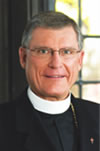 Dr. Gerald B. Kieschnick, 64, St. Louis, LCMS president since 2001, 1,055 nominations. He was president of the Texas District from 1991 to 2001, on the staff of the Lutheran Foundation of Texas from 1986 to 1991, and a pastor from 1970 to 1986. He is a 1970 graduate of the Concordia Theological Seminary in Springfield, Ill.
Dr. Gerald B. Kieschnick, 64, St. Louis, LCMS president since 2001, 1,055 nominations. He was president of the Texas District from 1991 to 2001, on the staff of the Lutheran Foundation of Texas from 1986 to 1991, and a pastor from 1970 to 1986. He is a 1970 graduate of the Concordia Theological Seminary in Springfield, Ill.
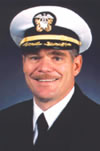 Dr. John C. Wohlrabe Jr., 53, Virginia Beach, Va., an LCMS chaplain in the U.S. Navy since 1987, 607 nominations. He is a graduate of Concordia Seminary, St. Louis, served as a pastor from 1982 to 1984, and as assistant director of Concordia Historical Institute from 1984 to 1986.
Dr. John C. Wohlrabe Jr., 53, Virginia Beach, Va., an LCMS chaplain in the U.S. Navy since 1987, 607 nominations. He is a graduate of Concordia Seminary, St. Louis, served as a pastor from 1982 to 1984, and as assistant director of Concordia Historical Institute from 1984 to 1986.
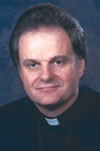 Dr. Wallace R. Schulz, 62, Augusta, Mo., evangelist with the Lutheran Heritage Foundation since 2002, 526 nominations. He was associate speaker for The Lutheran Hour from 1977 to 2002, an admissions counselor at Concordia College, River Forest, from 1974 to 1977, and a pastor from 1973 to 1974. A 1973 graduate of the Springfield seminary, he served as a Synod vice-president from 1995 to 2004.
Dr. Wallace R. Schulz, 62, Augusta, Mo., evangelist with the Lutheran Heritage Foundation since 2002, 526 nominations. He was associate speaker for The Lutheran Hour from 1977 to 2002, an admissions counselor at Concordia College, River Forest, from 1974 to 1977, and a pastor from 1973 to 1974. A 1973 graduate of the Springfield seminary, he served as a Synod vice-president from 1995 to 2004.
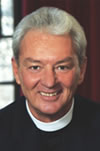 Dr. William R. Diekelman, 60, St. Louis, LCMS first vice-president since 2004, 315 nominations. A 1973 graduate of Concordia Seminary, St. Louis, he served as president of the Oklahoma District from 1991 to 2004 and as a pastor from 1973 to 2004.
Dr. William R. Diekelman, 60, St. Louis, LCMS first vice-president since 2004, 315 nominations. A 1973 graduate of Concordia Seminary, St. Louis, he served as president of the Oklahoma District from 1991 to 2004 and as a pastor from 1973 to 2004.
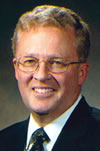 Rev. Daniel Preus, 58, St. Louis, director of Luther Academy and a pastor at Hope Lutheran Church, 145 nominations. He served as first vice-president from 2001 to 2004, as director of Concordia Historical Institute from 1995 to 2001, and as a pastor from 1975 to 1995. He is a 1975 graduate of the Springfield seminary.
Rev. Daniel Preus, 58, St. Louis, director of Luther Academy and a pastor at Hope Lutheran Church, 145 nominations. He served as first vice-president from 2001 to 2004, as director of Concordia Historical Institute from 1995 to 2001, and as a pastor from 1975 to 1995. He is a 1975 graduate of the Springfield seminary.
All five nominees have responded to four questions asked by the staff of the LCMS Board for Communication Services. (To fit space, their original responses were edited, with their approval.)
What, in your opinion, is the most pressing issue facing The Lutheran Church—Missouri Synod today? How would you, as president, address it?
Kieschnick: Our most pressing issue is renewed focus on God’s mission to reach lost people through proclamation of justification by grace through faith in Christ. “Salvation is found in no one else, for there is no other name under heaven given to men by which we must be saved” (Acts 4:12).
As LCMS president, I have encouraged a vision commended by the 2004 convention:
- One Mission—to reach lost people for Christ!
- One Message—Christ alone is the Savior of the world!
- One People—called to unity in Christ through Gospel and Sacraments!
As president, I will continue to lead and encourage Synod officers, district presidents, seminaries, universities, boards, commissions, organizations, pastors, commissioned ministers, and lay leaders to make this vision reality.
The apostles said, “We cannot help speaking about what we have seen and heard” (Acts 4:20). We are a confessional church. Our confession must be heard as we share Christ’s love. “In grateful response to God’s grace and empowered by the Holy Spirit through Word and Sacraments, the mission of The Lutheran Church—Missouri Synod is vigorously to make known the love of Christ by word and deed within our churches, communities, and the world” (LCMS Mission Statement).
Wohlrabe: Our Synod is divided over doctrine and practice. The pressing issue is our primary objective to “conserve and promote the unity of the true faith.” We have not always maintained our confessional Lutheran integrity, leaning at times toward liberal Protestantism or reformed evangelical fundamentalism.
As president, I would promote scriptural and confessional theology; furnish materials for pastors to provide Gospel-centered teaching about the means of grace, missions, church fellowship, worship, and other areas where there is division; encourage synodical conventions to support uniformity in doctrine and practice; and encourage our district leaders to assist in conserving and promoting this unity.
Schulz: Christ’s Church has always struggled to remove discord and division. In 1525, Luther wrote to a church that requested his help. Referring to God’s Word and observing how church councils tried unsuccessfully to correct and renew Christ’s Church through many rules, Luther advises, “In the end these rulings and canons became great snares for the soul and pitfalls for the faith. We need good spiritual teachers who will know how to lead the people with wisdom and discretion.”
The future of the LCMS lies not in manmade rules, but in pastors and teachers who teach the living Word of Jesus (John 6:63). God’s living Word is information and light for the road ahead, and it does something we can never do for ourselves. This Word miraculously cleanses our sinful hearts and heals divisions Satan has created among us (Hosea 6:1).
Diekelman: Today, many voices claim to know the way to eternal salvation. We know the only way is by the grace of God through faith in Jesus Christ. Jesus said, “I am the Way and the Truth and the Life. No one comes to the Father except through Me.” The LCMS mission statement says that our mission is “vigorously to make known the love of Christ by word and deed within our churches, communities, and the world.” With one voice we must move forward in one mission as the people of God.
I would give passionate leadership to help congregations strengthen and nurture one another with the Word of God so they may actively reach those who do not have a saving relationship with Jesus Christ. At the same time, I would strive to expand the work around the world through our efforts and our partner churches.
Preus: The greatest challenge is retaining our identity as Lutherans. As pastors and congregations assert their independence, we drift apart as a Synod. We seem to be more divided in our doctrine and practice than we have ever been.
The president needs to place less emphasis on bylaws and rulings of the Commission on Constitutional Matters and assist our Synod in refocusing on the
scriptural witness laid out so clearly in our Lutheran Confessions. Then, by God’s grace, our Lutheran Church—Missouri Synod will not be just another “conservative” evangelical denomination, but will offer to our congregations and those around us the understanding of the Gospel and the Sacraments that has been our Reformation heritage.
What other issues need to be addressed over the next three years?
Kieschnick:
Integration of doctrine and practice, acknowledging our doctrinal solidarity while addressing any disagreements over how to put doctrine into practice in a culture largely indifferent or hostile toward Christianity.
- Encouraging congregations in recruiting church workers and supporting our seminaries, colleges, and universities in educating for 21st-century
mission and ministry. - Proper compensation and care for professional church workers.
- Adequately funding the mission at all levels.
- Stronger ministry to youth and children to address the loss of 75 percent of our young people between infant Baptism and their 21st birthday.
- Assisting congregations that recognize the need for renewed vitality as they face decline or possible closure.
Wohlrabe: We should
- strengthen pastoral education, reinforcing the heritage of our seminaries in providing solid, confessional theological education;
- improve the care of church workers by studying attrition and retention rates, salaries, and congregational relations, and encouraging evangelical mentoring;
- maintaining excellent Lutheran education in our schools;
- examine restructuring on the synodical and district levels for stewardship of resources, while maintaining our traditional polity that balances clergy and laity.
Schulz: To reduce politics and heal divisions, we need to return to our early polity with each congregation sending one pastor and one layperson to the national conventions. Representation brings involvement. Involvement brings prayer and financial support. Impossible? If the LCMS can bring together 30,000 youth, then 12,000 adults surely should be able to gather for a triennial convention! We need to cultivate and fertilize the roots—Christ’s people—in our congregations.
Diekelman: We must thank all professional church workers, including our seminary and university faculties, for their leadership. They are instrumental in caring for the church today and raising up leaders for tomorrow.
We must focus on recruiting and retaining professional church workers, developing ways to fund university and seminary education, deploying more missionaries into the field, embracing diverse cultures by proclaiming the Gospel, identifying and incorporating new funding models, maintaining strong youth ministry, engaging the aging, and expanding volunteer opportunities.
Preus: Nothing is more precious to sinful people than the message of forgiveness that is ours through the life, suffering, death, and resurrection of our Savior Jesus Christ. In our increasingly secular society, it should be the goal of every LCMS pastor and congregation to reach as many people as possible with this saving Gospel.
This outreach will happen when God’s Word is proclaimed clearly in our own congregations. The Holy Spirit will, through the power of His Word, strengthen and motivate our pastors and laypeople to bring this message to those around them. Growth strategies based on secular marketing models are not appropriate in the church, nor will our church be blessed through using such programs. Our Synod was designed to help, not rule over, the congregations and will be most effective when it operates from the bottom up.
The Task Force for Funding the Mission has offered 11 recommendations to the convention. Please share your thoughts about the report.
Kieschnick: Most significantly, the task force, while recognizing the sacrificial gifts of faithful stewards, recommends a “stewardship renaissance” in our Synod. A large majority of our congregations do nothing each year regarding stewardship. This needs—and is receiving—attention, not merely for the sake of funding
the mission at all levels, but also for the sake of the spiritual health and vitality of God’s people in the LCMS. Jesus said, “Where your treasure is, there your heart will be also” (Matt. 6:21).
Wohlrabe: The task force should be commended for a thorough appraisal without placing blame for funding challenges. I share concerns over divisions in our Synod and for restructuring to eliminate inefficiencies. I agree with commending seminaries and universities for outstanding financial development. I support the proposal for biblical, Gospel-centered stewardship materials.
My chief concern is over human efforts to “grow the church” with programs and consultants rather than through sound theology. It seems that success is evaluated by membership growth and giving. Christ builds His Church, and the Holy Spirit calls people through the means of grace. We live under the cross, and God’s growth is not always measured in human terms.
Also troubling is the recommendation that could be construed as taxation of congregations and service organizations for synodical membership. And there seems to be an attempt at shaming people into giving and evangelizing. This is Law-oriented motivation. Motivated by the Gospel, we give from gratitude to our Lord.
Our Synod was formed to promote doctrinal unity, the education of church workers, and missions. If these become our main emphases, and our members understand this, we will be excited about supporting the “common good” of the Synod.
Schulz: I hear that pastors are not receiving this plan very well. We need to return to Bible-based stewardship with the Gospel at the center, not by telling our pastors and congregations what they have to do. If this sounds too blunt, remember that our Lord loves a cheerful giver! God’s Gospel moves even poor and needy people to give beyond their ability.
Diekelman: First, we thank the task force for addressing this difficult and sensitive subject. The task force reminds us of the generosity of people who support the church’s work through their regular offerings and special gifts. The task force recognizes that new patterns of giving also fund the Synod’s work.
Underlining this report are ongoing stewardship education, clear communication about the Synod’s activities, and celebration of the blessing to be part of the LCMS. The task force suggests ways to implement new patterns of funding. Ultimately, as a church, we must decide how to fund the mission.
Preus: It is evident that the task force spent much time and thought on the report. They made a number of helpful observations and recommendations. Most helpful was the recognition that the Synod needs to connect more with our congregation members. Most of our members are not aware of how our church’s work is funded. So improved communication is essential. The task force also noted the negative effects of division. My conviction is that we will not be successful in “funding the mission” unless divisions in doctrine and practice are first resolved in a God-pleasing way.
What is your opinion of Ablaze!, the initiative to share the Gospel with 100 million unreached or uncommitted people worldwide by 2017?
Kieschnick: Ablaze! is generating excitement about mission in LCMS congregations and renewed energy and vitality in our partner churches! Some have expressed theological concerns, but our seminary presidents and other key theological leaders have said, “Following a review of the Ablaze! initiative we do not find anything in it to be inconsistent with the Scriptures and the Lutheran Confessions.” Ablaze!, along with the Fan into Flame campaign, will continue to be a great blessing to the LCMS!
Wohlrabe: There is nothing wrong with setting bold goals. Since its founding, mission work has been a main objective of the Synod. But in line with our Lutheran doctrine of church and ministry, mission outreach has been closely linked with existing congregations and establishing new congregations. Unfortunately, I do not see this emphasis in Ablaze! Our Lord’s Great Commission presupposes Word and Sacrament, church and ministry, congregations and pastors. Lutheran congregations need to be connected intimately with our mission focus.
Schulz: Ablaze! is based on Acts 1:8 instead of the text the Church has used historically, Matt. 28:19–20. There, Jesus instructs us to evangelize, not merely
with a passing witness, but by preaching, teaching, and baptizing with His living Word.
The definition of the “critical event” for counting progress does not include the evangelization of infants, something Jesus taught very decisively (Matt. 19:14). An evangelism plan that omits Baptism of infants runs the risk of forfeiting Christ’s blessing and risks His judgment (Matt. 18:6). If God is to bless our mission, we need to base our outreach on Christ’s Great Commission to preach, teach, and baptize, and model our outreach on that of the Master: teach and teach some more.
With many faithful pastors and congregations, we have potential to be the greatest Reformation church body in the United States. We need to see our future through the eyes of Jesus—not based on our daily failures, but on what He promises, by His life-giving Word and Spirit, to re-create in and through us. This is our prayer, dear Lord Jesus: “Let Your light shine upon us!”
Diekelman: The power of the Holy Spirit is being made manifest through the Ablaze! movement. Our congregations have been stirred to action in creative ways to bring the Good News of Jesus Christ to their communities and the world. LCMS people have boldly witnessed to unchurched friends and neighbors about the hope that is in them for eternal salvation. We must concentrate on this important work and not allow anyone or anything to distract us. With my prayers and financial offering to Fan into Flame—the $100 million campaign to fund the Ablaze! movement—I fully support this modern-day Pentecost initiative. I pray that this work, begun years ago, will not stop at 2017.
Preus: I write these words from Pretoria, South Africa, where I am teaching for a semester at Lutheran Theological Seminary, which has students from South Africa, Uganda, Sudan, Kenya, Liberia, and Botswana. My time with these students—as well as visits to South America, Indonesia, and other parts of the world—convinces me that we live in an extremely exciting time for supporting the mission of proclaiming the Gospel. One very effective way is through education—teaching pastors who then equip laypeople so together they can bring the Word to their communities where God brings many to embrace His grace in Jesus Christ.
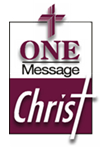
—





